It got colder overnight in Munich, from Tuesday to Wednesday. Measurable in degrees Celsius in the temperatures, but for many also felt because of the death of Franz Beckenbauer, the city’s most famous footballer, whose radiance always warmed oneself. Now time seems to stand still, frozen, at least at FC Bayern Munich, Beckenbauer’s club. The club has colored its website in black and white: “FC Bayern mourns Franz Beckenbauer.” On the Monday evening after the death became known, someone placed a flower arrangement in front of the office on Säbener Strasse and lit a candle.
Franz Beckenbauer in 2016 at the Allianz Arena.
(Photo: Andreas Gebert/dpa)
From 1964 to 1977, Beckenbauer played for FC Bayern, brought practically all football titles to Munich as a player and coach, led the national team to World Cup success in his hometown and brought the 2006 world tournament to Germany – with six sold-out games in the Fröttmaninger Arena . A large memorial service for Franz Beckenbauer will take place there on January 19th from 3 p.m. The German football record champions announced this on Tuesday evening. The people of Munich therefore invite “friends and companions from national and international sports, culture and politics, as well as all fans and the entire football family in general, to say goodbye to the unforgettable “Kaiser” in a special, emotional setting.” As the club also announced on Tuesday, the stadium will be lit up with the words “Thank you Franz” in the evenings from 4:30 p.m. to 11 p.m. in the coming days. On Friday at the Bundesliga home game against TSG 1899 Hoffenheim (8:30 p.m.), the lighting should even be visible until 1 a.m.
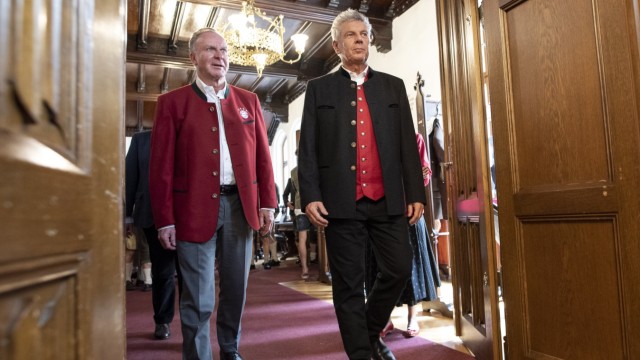
Ex-FCB board boss Karl-Heinz Rummenigge (left) and Mayor Dieter Reiter at the championship and cup winners celebration in Munich City Hall in 2019.
(Photo: Sebastian Gabriel)
The city is expressing its sadness and appreciation for Beckenbauer by putting out a book of condolence until Friday, “in which all Munich residents can sign,” explained Mayor Dieter Reiter (SPD). The town hall is open daily until Thursday from 9 a.m. to 5 p.m. and on Friday from 9 a.m. to 1 p.m. Further honors such as renaming a street or square after the deceased are likely. The FDP and the Bavarian Party have already officially requested this. The council of elders of the city council usually decides on this. “We will determine everything else in the next few days,” announced Reiter.
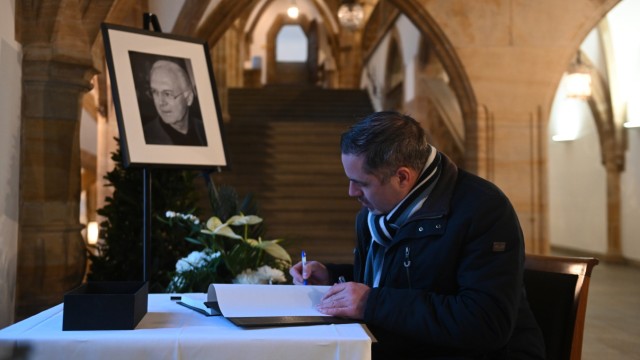
The condolence book in the town hall is opposite room 200.
(Photo: Stephan Rumpf)
The mayor’s initial reaction on Monday evening was dismayed: “The news of Franz Beckenbauer’s death hits me very hard. An era is coming to an end with him. He was an exceptional footballer, a great role model for so many football fans. What remains are his Inspiration for generations of football players,” said the avowed Bayern fan: “Personally, I will miss talking to him. I wish his wife and children a lot of strength for this difficult time.”
Mayor Dominik Krause (Greens) also emphasized Beckenbauer’s services to his hometown. “He was down-to-earth and cosmopolitan at the same time and therefore typical of Munich. Our city has never had such a positive ambassador before.” Alluding to Beckenbauer’s time in New York and his international reputation, Krause suggested that he was “probably the first Giesinger in Studio 54,” one of the metropolis’ most famous nightclubs.
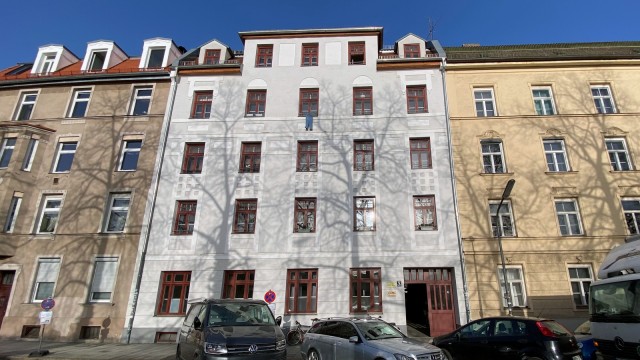
The football legend grew up in this house on Zugspitzstrasse.
(Photo: René Hofmann)
Beckenbauer grew up in the post-war period at Zugspitzstrasse 6 in Giesing. At times, eight of the Beckenbauers lived there in the apartment on the fourth floor. As a boy, he once said, he collected rags and scrap iron to exchange a fabric ball for a leather ball. This is how his world career began.
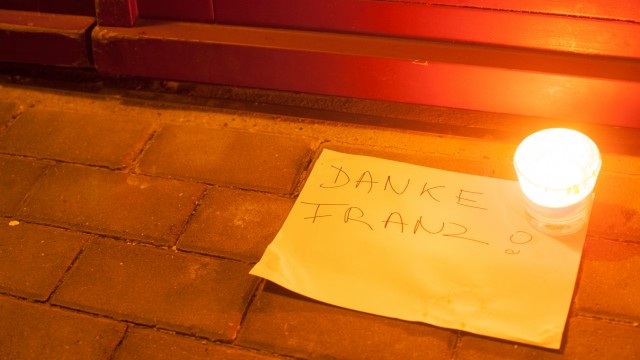
Remembrance in front of the house on Zugspitzstrasse.
(Photo: René Hofmann)
On Monday evening someone had placed a candle and a note in front of Beckenbauer’s first home address. “Thank you, Franz!” it simply says. The two former Bayern players and 2014 world champions Philipp Lahm and Bastian Schweinsteiger also mourned.
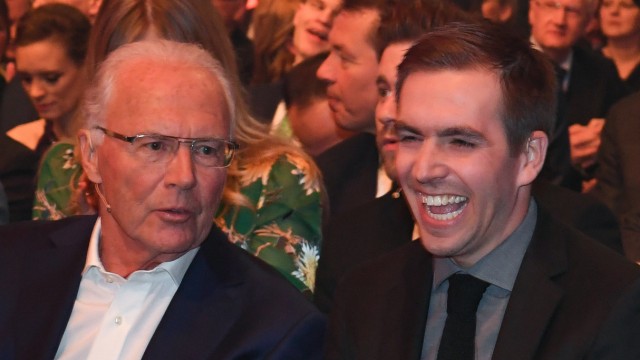
Beckenbauer and Philipp Lahm (right) at the gala for the inauguration of the German Football Hall of Fame in 2019.
(Photo: Ina Fassbender/dpa)
Beckenbauer is the greatest figure “that German football has ever produced,” wrote Lahm on Portal X (formerly Twitter). The 2014 World Cup captain added that Beckenbauer was “infinitely far” ahead of his time. “The 2006 World Cup, the summer fairy tale, taught a self-critical nation to like itself again,” wrote Lahm. This social success would not have been possible without Beckenbauer. He, Lahm, is “infinitely grateful that I was able to be part of it.”
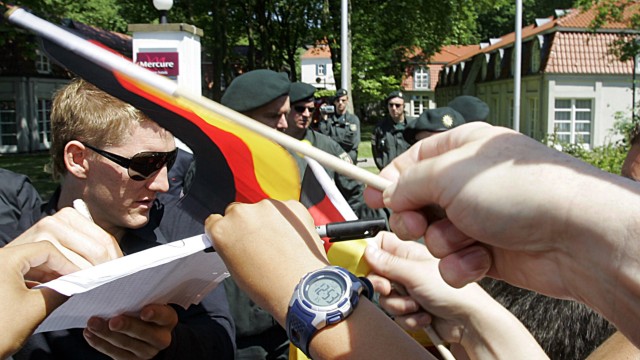
Bastian Schweinsteiger signs autographs during the 2006 World Cup – in front of a hotel in Castrop-Rauxel where the German national soccer team was staying.
(Photo: Bernd Thissen/dpa)
Bastian Schweinsteiger, who also played at the 2006 World Cup in Germany, wrote: “Thank you for everything, Kaiser – I will never forget you!”

Franz Beckenbauer, then FC Bayern president (from left), ex-mayor Christian Ude and the then president of TSV 1860 Munich, Karl-Heinz Wildmoser, view one of the two winning models of the new arena in 2001.
(Photo: Frank Leonhardt/dpa)
Former mayor Christian Ude (SPD) sees Beckenbauer’s death as a “serious farewell” for himself and the city. “He’s been with me almost my whole life,” he said on the phone. As early as 1971, on a train ride to Turkey, guest workers traveling with him asked him where he came from. When Ude replied “from Munich”, her reaction was difficult for the self-confessed Lions fan to bear: “Ahh, Beckenbauer’s city.” They later met again in the office when Beckenbauer appeared not only with his partner but also with his mother to accept an award. The meeting was “fun, warm and stimulating,” Ude remembers.
Later, the mayor at the time got to know him from another side. When Beckenbauer vehemently demanded a new football stadium of his own for FC Bayern, he initially attacked the city “impatiently, almost without control.” It took a while for the city and the club to get closer, and ultimately Ude and Beckenbauer worked together to advertise the arena in Fröttmaning. Internationally, the stadium was viewed as an “emperor’s palace,” remembers Ude. The opening game of the 2006 World Cup played there would not have been possible without Beckenbauer’s influence: “It shaped the city of Munich as a figure in public life.”
In the FC Bayern flagship store behind the town hall on Tuesday, immediately after the store opened, the first fan had Beckenbauer’s number 5 flocked to the club’s current home jersey. Otherwise, tourists from Asia who had little use for the name Franz Beckenbauer (“he still plays?”) or mothers who were looking for a gift for their sons initially wandered into the store.
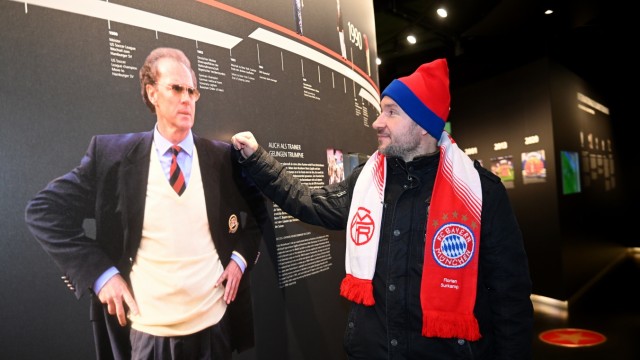
In the Bayern Museum in the arena, visitor Florian Surkamp approaches his idol.
(Photo: Stephan Rumpf)
There was more activity in the Bayern Museum in the Fröttmaninger Arena, where a book of condolence was to be displayed. But there were mostly tourists there too. Florian Surkamp from Landshut was one of the few to be recognized as an FC Bayern fan thanks to his club cap and corresponding fan scarf with his name embroidered on it. A lot has always revolved around Franz Beckenbauer in the museum; Surkamp raved about “all the relics that are here.” He said that Beckenbauer’s death affected everyone: “He was an icon of German football, not just of the club.”

